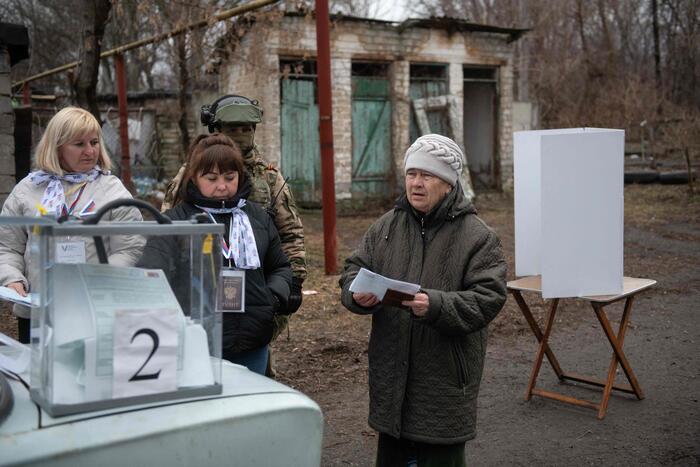The Moscow head of the governing party "United Russia" is losing his seat in the city parliament. The opposition celebrated the news that Andrei Metelsky is now without a mandate - after all, his defeat symbolizes the weakness of the Kremlin party in the Russian capital.
13 seats have lost "United Russia" in the 45-seat parliament. Officially, none of the candidates were ever in favor of the party, as unpopular is it by now: they called themselves seemingly independent politicians. 15 candidates from the opposition, which is actually independent of the Kremlin - members of Alexei Navalny's team, including Ljubov Sobol, and politicians Dimitrij Gudkov and Ilya Yashin - were not admitted at all.
All this has nothing to do with it: The Moscow regional parliament now has 20 members of the opposition: 13 from the Communist Party, three from the Left Party "Just Russia" and four from the liberal Yabloko. The latter can be described as an opposition party in the Western sense. Communists and "Just Russia" are called system opposition because they are loyal to the Kremlin in the Duma.
Therefore, the headline "Party of power loses Moscow" of the liberal-liberal newspaper "Vedomosti" something premature. It must first be seen how the Communist deputies and "Just Russia" will behave in the regional parliament. Are you looking for a serious political competition to "United Russia"? Or do they continue to nod everything in the direction of the Moscow leadership?
Tactical Voting against Kremlin party
Andrew Lubimov / DPA
Vote in Moscow: The opposition Alexey Navalny
The other parties also owe their entry into the Moscow parliament to Nawalny. He had called for a "smart" vote, a tactical vote against "United Russia". Citizens should vote for the candidate who had the most chances to win against the representative of the Kremlin party (read more here). This strategy has worked in Moscow.
"United Russia" is as unpopular as ever. Just a third of Russians still support the party today, also because the economy is stagnating and real incomes are falling. Anger triggered above all the unpopular increase in the retirement age last summer.
In the regional elections last autumn, "United Russia" suffered severe defeats. In two regions, governors - which in Russia is about a prime minister - are governed by the right-wing populist LDPR, in one region a Communist was elected. In Khabarovsk in eastern Russia, after the election on Sunday, the governor's LDPR party now holds a majority in the regional parliament.
more on the subject
In Moscow, where the proportion of western-oriented, more liberal residents is higher, the agreement for the Kremlin party is even lower. This is another reason why they decided not to admit the 15 candidates of the opposition - for fear that they could win their constituencies clearly.
In the coming year, the vote on the Duma is pending. The better-known candidates of the opposition did not want to give them the opportunity to celebrate their successes and to become even stronger. As a reason for the electoral exclusion, the authorities said that the supporters 'supporters' signatures had too many mistakes.
This triggered outrage and protests, almost every weekend people demonstrated over the summer. The result was police violence and political persecution with high prison sentences for six mostly young men. From Moscow, which likes to present itself as a cosmopolitan city with its renovated parks and streets, ugly pictures of beating police officers and demonstrators in prison cages went around the world.
The Kremlin had to accept that. There remained only the means of intimidation to control the protests.
Massive interventions in Saint Petersburg
Politically, however, the Kremlin faces a dilemma ahead of the important Duma elections in 2020. It is increasingly difficult for him to organize good election results for the candidates of "United Russia". Interest in the thousands of votes in the 85 regions was mostly low on Sunday. In Moscow, where singers, amateurs, food stalls and games programs were organized, just over 21 percent of voters took part.
Dmitri Lovetsky / DPA
Supported by the Kremlin: Governor Alexander Beglov in St. Petersburg
Formally, the Kremlin party remains the strongest political force, as the chairman and Prime Minister Dmitry Medvedev emphasized immediately after the polls closed. First reports had already been received that all 16 electors of "United Russia" had prevailed - seven of them appeared to be independent.
For his electoral success, the Kremlin must do more and more after 20 years with Vladimir Putin at the helm:
- Repression against the opposition has increased. Especially against the Navalny people is proceeding. They now have millions of followers on social media.
- The state propaganda really denigrates independent candidates.
- On election days, senior officials and employees of the authorities must ensure that their employees vote in favor of power.
The rule is that the more important the choice, the greater the commitment. Also on Sunday, there were, according to the independent Golos election observers hundreds of violations, such as the throwing of several ballots into the polls.
Especially in Putin's native city of St. Petersburg, the Kremlin intervened massively to ensure the electoral victory of the unpopular acting governor Alexander Beglow in the first ballot with more than 65 percent. Gradually, strong opponents were vilified and forced to give up, the last was a well-known director and communist. On election day, election observers were attacked. There were also reports from observers that money and other things had been offered to vote for Beglow. A representative of "Just Russia" wrote of up to 3000 rubles (about 41 euros) and vodka.
The head of the Central Electoral Commission, Ella Pamfilova, on the other hand, spoke of a "minor number of election violations".














